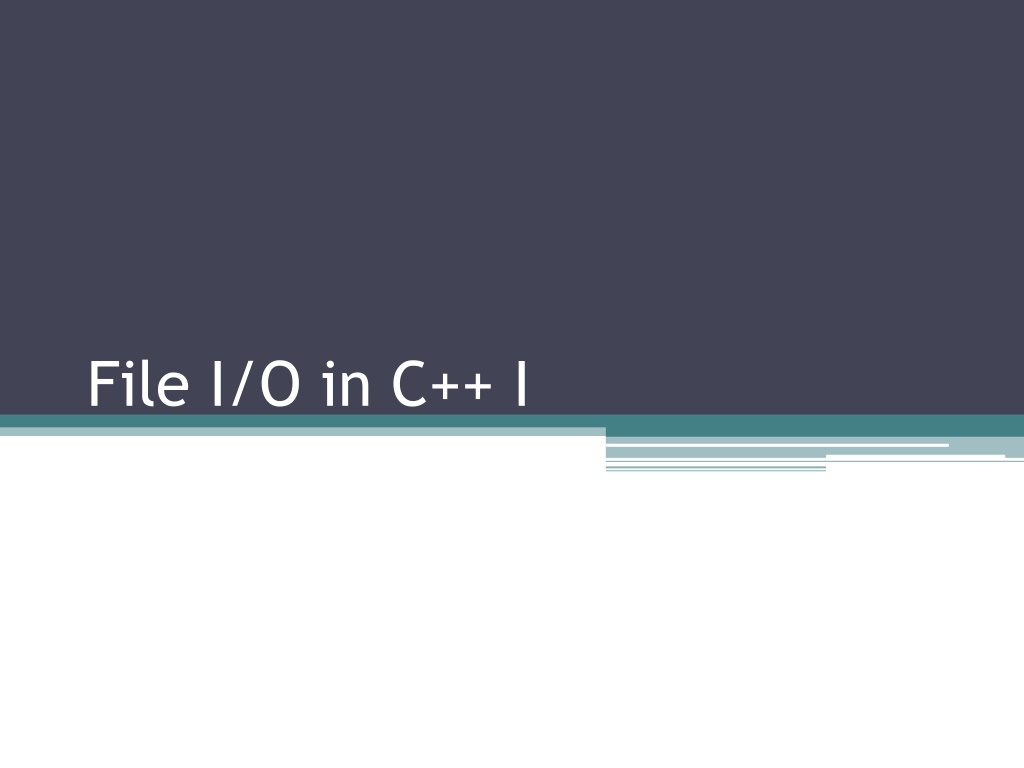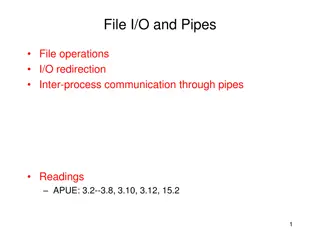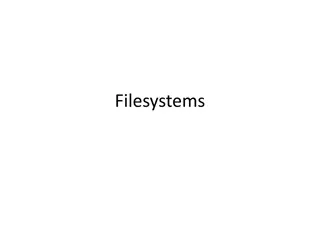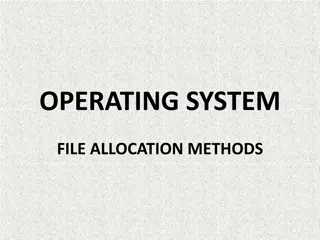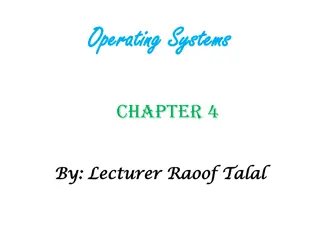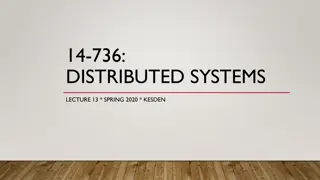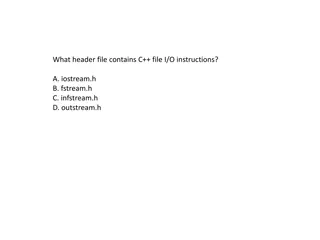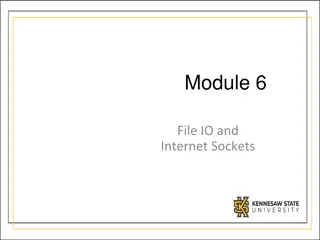Understanding File Input/Output (I/O) in C++
File Input/Output (I/O) is an essential concept in C++ programming, allowing for interaction with files stored on secondary storage devices. This involves steps like including the fstream header file, declaring file stream variables, associating them with input/output sources, opening the file, performing operations, and closing the file. Different classes such as ios, istream, ostream, fstream, and more are involved in stream I/O. The process involves input and output streams that can be connected to the keyboard and display, as well as reading/writing data to files. Understanding these concepts is crucial for efficient file handling in C++.
Download Presentation

Please find below an Image/Link to download the presentation.
The content on the website is provided AS IS for your information and personal use only. It may not be sold, licensed, or shared on other websites without obtaining consent from the author. Download presentation by click this link. If you encounter any issues during the download, it is possible that the publisher has removed the file from their server.
E N D
Presentation Transcript
Using Input/Output Files A computer file is stored on a secondary storage device (e.g., disk); is permanent; can be used to provide input data to a program or receive output data from a program or both; should reside in Project directory for easy access; must be opened before it is used.
General File I/O Steps 1. Include the header file fstream in the program. 2. Declare file stream variables. 3. Associate the file stream variables with the input/output sources. 4. Open the file 5. Use the file stream variables with >>, <<, or other input/output functions. 6. Close the files.
Classes for Stream I/O in C++ ios is the base class. istream and ostream inherit from ios ifstream inherits from istream (and ios) ofstream inherits from ostream (and ios) iostream inherits from istream and ostream (& ios) fstream inherits from ifstream, iostream, and ofstream
STEP1 : Include the header file stream - a sequence of characters interactive (iostream) cin - input stream associated with keyboard. cout - output stream associated with display file (fstream) ifstream - defines new input stream (normally associated with a file). ofstream - defines new output stream (normally associated with a file). #include <fstream>
STEP2 : Declare file stream variables. ifstream fIn; ofstream fOut; // output fstream both //input & output //input
STEP3 : Associate the file stream variables with the input/output sources. One way is to do it like this : ifstream fIn( file1.txt ); // input ofstream fOut( file2,txt ); // output fstream both ( file3.txt ); //input & output
STEP4 : Open the file Opening a file associates a file stream variable declared in the program with a physical file at the source, such as a disk. In the case of an input file: the file must exist before the open statement executes. If the file does not exist, the open statement fails and the input stream enters the fail state In the case of an output file: An output file does not have to exist before it is opened; if the output file does not exist, the computer prepares an empty file for output. If the designated output file already exists, by default, the old contents are erased when the file is opened.
Object and Member Functions open() Member Function Name Stream handle Name both.open("numbers.txt ) File Name Dot Dir: \ \ folder\fileName.exten tion Extention ( .dat, .out, .txt) Calling Object Operator
Validate the file before trying to access First method Second method By checking the stream variable; By using bool is_open() function. If ( !both.is_open()) {Cout << File is not open. ;} If ( ! both) {Cout << Cannot open file ;}
File I/O Example: Open output file with validation #include <fstream> using namespace std; void main() { // declear output file variable ofstream outFile; // open an exist file fout.txt outFile.open( fout.txt ); // Open validation if(! outFile.is_open() ) { Cout << Cannot open file.\n ;} }
STEP5: use the file stream STEP6: close the file File I/O Example: Writing #include <fstream> using namespace std; void main() { /* declear and automaticaly open the file*/ ofstream outFile( fout.txt"); //behave just like cout, put the word into the file outFile << "Hello World!"; outFile.close(); }
STEP5: use the file stream STEP6: close the file File I/O Example: Writing #include <fstream> using namespace std; Void main() { // declear output file variable ofstream outFile; // open an exist file fout.txt outFile.open( fout.txt ); //behave just like cout, put the word into the file outFile << "Hello World!"; outFile.close(); }
File I/O Example: Reading Read char by char #include <iostream> #include <fstream> void main() { //Declare and open a text file ifstream INFile( data.txt"); char ch; //do until the end of file while( ! INFile.eof() ) { INFile.get(ch); // get one character cout << ch; } INFile.close(); // close the file // display the character }
File I/O Example: Reading Read line by line #include <iostream> #include <fstream> #include <string> int main() { //Declare and open a text file ifstream INFile( data.txt"); string line; while(! INFile.eof()) {/fetch line from data.txt and put it in a string getline(INFile, line); cout << line; } INFile.close(); // close the file }
Example writing to file #include <iostream> #include <fstream> using namespace std; void main() { ofstream outFile; // open an exist file fout.txt outFile.open("number.txt",ios::app); if (!outFile.is_open()) { cout << " problem with opening the file ";} else {outFile <<200 <<endl ; cout << "done writing" <<endl;} outFile.close(); }
Example Reading from file #include <iostream> #include <fstream> #include <string> #include <sstream> using namespace std; void main() {//Declare and open a text file ifstream INFile("number.txt"); string line; int total=0; while(! INFile.eof()) {//fetch line from number.txt and put it in a string getline(INFile, line); //converting line string to int stringstream(line) >> total; cout << line <<endl; cout <<total +1<<endl;} INFile.close(); // close the file }
